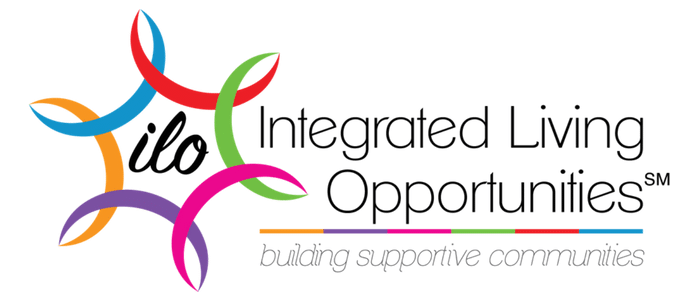Integrated Living Opportunities has one mission: to help our adult self-advocates with significant challenges (along with their families) build intentional, integrated, inclusive communities. It is our goal that these communities enable safe, productive, and independent living options for these self-advocates as they grow and learn new skills.
At ILO, we recognize that an important part of independent living and community integration is employment. Meaningful and rewarding employment offers a number of benefits; it can provide the opportunity for individuals with disabilities to develop and hone a sense of purpose and a sense of self. It can increase self-confidence and is psychologically beneficial. It provides opportunities to grow, learns new skills, and socialize with peers. And, in addition to all of the above benefits, employment is often a financial necessity for many individuals that wish to pursue independent living.
At ILO we recognize that there are many barriers for individuals with disabilities to overcome when searching for employment. Today, we would like to discuss a program that has been developed to help knock down those barriers: Vocational Rehabilitation.
Vocational Rehabilitation: What Is It?
Vocational Rehabilitation (VR) is a federally funded, state-administered program that provides any necessary support and training to ensure that individuals with disabilities are able to obtain and maintain meaningful employment. VR was developed as a part of the Rehabilitation Act of 1973, which was put in place to combat discrimination against people with disabilities in the United States. This discrimination “arose from negative attitudes in regard to the ability of individuals with disabilities to be effective employees, as well as physical barriers at work facilities.[1]”
All services offered under the VR umbrella have one goal: helping individuals with disabilities obtain employment. Once eligibility is proven, the VR program offers assessment and counseling services, provides guidance for the Individualized Plan for Employment, and offers job-related and post-employment services.
(Note: For more information, please visit M&L Special Needs Planning’s webpage Vocational Rehabilitation.)
VR Eligibility & Services
Eligibility Requirements: Federal eligibility requirements state that in order to be eligible for the VR program, a person must have a mental or physical disability which constitutes a significant barrier to employment, can benefit from VR services to achieve an employment outcome, and requires VR services to prepare for, secure, retain or regain employment.
Vocational Assessment and Counselling: After an individual has been deemed eligible for the program, he or she will work with a VR counsellor to identify job interests, skills, aptitudes, etc. The counsellor will also determine which services the individual needs, and make any necessary referrals to other agencies. As a part of this process, the individual will ultimately identify and clarify career goals and will begin the process of completing the Individualized Plan for Employment (IPE).
Individualized Plan for Employment: The IPE is an individual plan of the steps necessary for an individual to obtain employment. It will include the individual’s employment goals and a description of the services needed for the individual to work (examples of these services include job training, supported employment, job coaching, tutoring, etc.). The plan also identifies who will provide and pay for those services, how the individual will progress towards employment, the responsibilities of the vocational rehabilitation counsellor, and the responsibilities of the individual seeking employment.
Job Related Services: Includes assisting individuals with job search and job placement services. The VR counsellor will work with individuals to help them identify, search, and apply for jobs that meet their employment goals.
Post-Employment Services: The VR program will offer support, advocacy, and follow-up services for 90 days after an individual has gained employment. After 90 days of maintaining employment, an individual’s case is considered successfully closed. An individual and his or her counsellor may identify services needed to keep the job, however.
Accessing VR for your Family Member with Special Needs
If you would like to begin the process of obtaining VR services for your family member with disabilities, the first step is to locate and contact your state’s VR agency (keep in mind – this agency may go by a different name depending on the state). A complete listing of the different Vocational Rehabilitation agencies for every state can be found by visiting the Job Accommodation website.
The Client Assistance Program is another avenue to explore for those who may be having trouble receiving Vocational Rehabilitation services. This program, often referred to as CAP, is a non-profit program that offers advocacy services and information about individual’s rights as vocational rehabilitation clients. CAP is available in every state. To find the CAP agency for your state, please visit the ICDRI website.
In many states, the services offered under Vocational Rehabilitation are offered without cost. Some states may require a statement of financial need, however, and depending on the available financial resources you may be required to pay for some services. As well, when states do not have enough funding to cover everyone wishing to participate in the program, they may operate on an “order of selection” basis, meaning that individuals with the most significant disabilities will be served first.
Would you Like More Info?
Thanks so much for taking the time to visit our blog today. We hope that we have provided you with some useful information to help you help your family member with disabilities begin the search for meaningful employment.
If you would like more information about Vocational Rehabilitation, please contact us! We would love to learn about the goals you have for the future of your family with special needs. As well, please do not hesitate to reach out and ask questions about the work that ILO does building intentional communities for adults with disabilities in Maryland and D.C.
